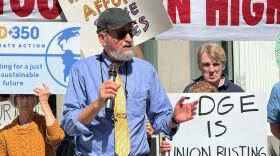The November general election could cost the city of San Diego as much as $5.5 million, well above what's in the budget, because of a large number of ballot measures, City Clerk Elizabeth Maland said Monday.
The projection from the county Registrar of Voters has a low end of $4.2 million, Maland said. She said the city has already dipped into its $4.17 million elections budget to pay for counting petition signatures for a pair of citizens initiatives that qualified for the ballot.
Her comments came as the City Council voted to place six propositions on San Diego's general election ballot. Among other things, San Diegans will be asked in November whether to provide clarity to procedures to remove a wayward elected official from office, reform the Citizens Review Board on Police Practices and establish a business tax on marijuana dispensaries.
San Diego voters could decide the fate of about a dozen propositions this fall.
"We're in a range — I just need to emphasize that so much is unknown and we've never encountered anything like this before," Maland told the council members. "What ultimately ends up occurring could veer wildly from this."
Two major variables will impact the cost, according to the city clerk. One is whether the city can put the text of the citizens initiatives online, instead of printing and mailing pamphlets. The other would be whether the city could mail pamphlets to households of registered voters, rather than each voter individually.
The initiatives — one for the Chargers' downtown stadium plan, and the other to prohibit an expansion of the convention center and encourage educational use of the Qualcomm Stadium property — are both expected to run over 200 pages, according to Maland.
Councilman Todd Gloria called on his colleagues to exercise caution in placing measures on the ballot and prioritize which ones really need to go before voters this year.
"I think some can wait," said Gloria, who chairs the council's Budget Committee.
The measure to remove officials stems from the difficulty three years ago of getting rid of scandal-plagued Bob Filner, the mayor at the time. He eventually resigned after being accused of sexual harassment by around 20 women.
Supporters contend that the City Charter — San Diego's primary governing document — doesn't have adequate provisions to address such situations. At a previous meeting, City Attorney Jan Goldsmith called the ballot measure "a safety valve" for San Diego.
If voters approve the Citizens Review Board measure in November, the panel's name would be changed to the Community Review Board on Police Practices, references to a city manager would be replaced by mayor and City Council, and a provision would require the board to review all in-custody deaths and officer-involved shootings.
A group called Women Occupy San Diego first brought the issue before the council in January, contending the board and police had lost community trust.
The marijuana proposal would establish a 5 percent levy on gross receipts on businesses that sell marijuana, should state voters pass a recreational use legalization proposition this fall. The tax would grow to 8 percent the second year, and the city would have the discretion to raise the amount to 15 percent in the future.
Cannabis sold for medical purposes would not be taxed under Councilman Mark Kersey's plan.
Kersey said approval of the state proposition would create an unfunded mandate that would financially burden city government, and taxpayers cannot be asked to divert funds from other areas to pay for it. He said the state ballot measure has a taxation provision, but little — if any — of that revenue would make it to San Diego.
Opponents worry that taxes would raise prices at legitimate outlets, increasing the black market in marijuana.
Most of the measures were placed on the ballot with 9-0 or 8-1 votes, but Kersey's proposal barely cleared the council on a 5-4 margin.
Including the recreational use proposition, the state has 17 measures headed for the November ballot. The county is expected to have two. The City Council will vote on several other municipal ballot measures on Tuesday.





